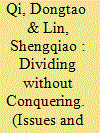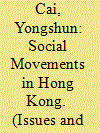| Srl | Item |
| 1 |
ID:
181399


|
|
|
|
|
| Summary/Abstract |
Based on the literature about the role of rising nationalism in recent world politics, this paper proposes a nationalism-oriented causal model to explain the voting choices of different social groups. With an interest-identity framework, this generic model is applied to Taiwan’s 2016 presidential election to examine whether and to what extent 11 causal mechanisms influence the voting choices of four groups defined by generation, class, and ethnicity. The findings not only reveal generational, class-based, and ethnic differences in Taiwanese voting behavior; they also show that the election was largely one of identity politics centered around the issues of national identity and democratic identification, making the “interest card” played by Beijing less effective in swaying voter choices. This explains why Beijing’s divide-and-conquer economic policy successfully divided Taiwanese voters but failed in the end to prevent the pro-independence candidate from winning the election. The findings also indicate that the economic concerns of voters promoted both their Taiwanese identity and support for Taiwan independence, while identification with Taiwan’s democracy contributed directly to the former and only indirectly to the latter. Overall, the model presents a more fine-grained analysis of nationalist politics and may be applied to the studies of other political behaviors involving nationalism.
|
|
|
|
|
|
|
|
|
|
|
|
|
|
|
|
| 2 |
ID:
181401


|
|
|
|
|
| Summary/Abstract |
Scholars of electoral autocracies accord far more attention to post-election protests than pre-election ones, as the former have the potential to trigger a regime transition. We argue that pre-election protests can have a significant effect on election outcomes. In particular, they are likely to deepen social cleavages along two dimensions: age and immigrant status. The 2019 social unrest in Hong Kong provides a unique opportunity to evaluate the electoral impact of pre-election protests. Comparing public opinion data related to the 2019 and 2015 District Council elections, we find strong empirical support for our argument, as immigrant status and age are strong predictors of voting choices and voter turnout. Our findings imply that exposure to democratic protests may not help in bridging the gap in political attitudes between immigrants and natives.
|
|
|
|
|
|
|
|
|
|
|
|
|
|
|
|
| 3 |
ID:
181402


|
|
|
|
|
| Summary/Abstract |
After Japan occupied Taiwan from the Quin Dynasty in 1895, the Japanese government immediately held talks with Spain to delimit the sea boundary between Spain and Japanese Taiwan. According to the Convention between Japan and Spain in 1895, the sea boundary of both countries was in the middle of the navigable channel of Bashi. For it did not refer to the longitude and latitude, thus it resulted in confusion when the United States negotiated a peace treaty with Spain. What is the meaning of “in the middle of the navigable channel of Bashi?” In the Treaty of Paris between the United States and Spain in 1898, Spain ceded the Philippines archipelagoes to the south of 20∘ North latitude to the United States. In fact, the Batanes Islands are located at 20–21∘ North latitudes. Geographically, the Batanes Islands were not included in the Treaty of Paris. This paper will focus on the reasons why did not Spain cede the territory to the north of 20∘ North latitude to the United States? And, it also discussed the problems of the legal status of the Batanes Islands and the rights of claim by Taiwan.
|
|
|
|
|
|
|
|
|
|
|
|
|
|
|
|
| 4 |
ID:
181400


|
|
|
|
|
| Summary/Abstract |
Social movements occur not only because of political opportunities but also due to a perceived threat to citizens. Popular contention has remained an important mode of political participation in Hong Kong since 1997 when its sovereignty was handed over to China. Many influential collective actions in Hong Kong occurred when residents felt a threat had arisen from policies made by the city government or Beijing. By examining the Anti-Extradition-Bill movement in Hong Kong, this paper explores how threat triggers and sustains social movements. It finds that threat both facilitates the mobilization of social movements and sustains them. Threat strengthens solidarity among movement supporters because of their shared concerns and goals. It sustains a movement when government responses confirm participants’ belief in the continual existence of the threat. The Anti-Extradition-Bill movement deepened the distrust between local residents and Beijing, resulting in the promulgation of the National Security Law by Beijing in May 2020.
|
|
|
|
|
|
|
|
|
|
|
|
|
|
|
|